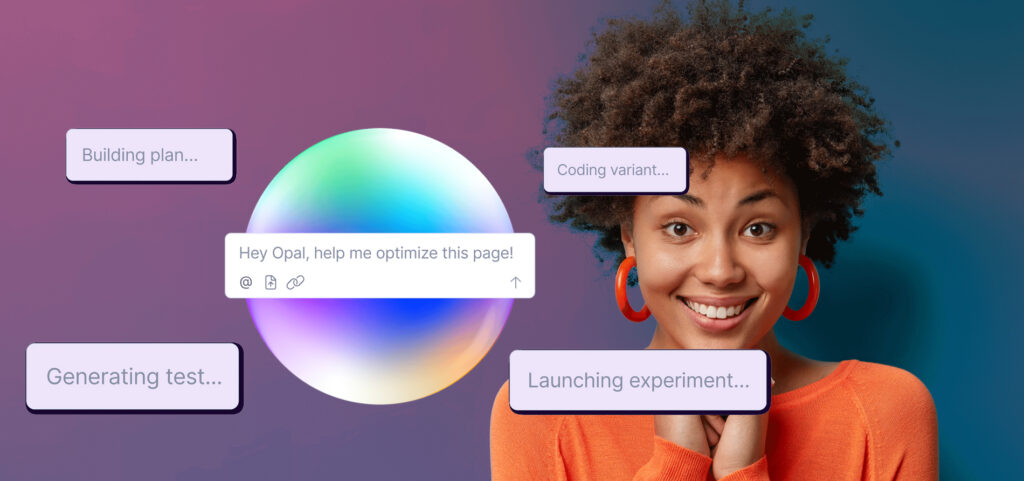This week, around 1,500 customers, partners, and industry leaders gathered in San Diego for Opticon, Optimizely’s flagship conference. While I wasn’t on the ground myself, several of our Optimizely OMVP colleagues were, and their takeaways made it clear: AI isn’t just part of the roadmap anymore. It is the roadmap.
Optimizely’s platform, including their flagship AI tool Opal, was front and centre – and judging by the demos, product announcements, and audience reactions, it’s safe to say we’ve entered the era of AI-first marketing assistants. But as powerful (and genuinely impressive) as these tools are, there was a common thread running through the conversations my team brought back:
“AI won’t fix what’s broken. It will expose it.”
That’s why the next chapter for marketers isn’t just about adopting AI, it’s about getting the fundamentals right before AI gets involved. Building foundations has never been more important.
One of the most talked-about demos involved Opal ingesting a Figma design file, auto-generating front-end code, building out structured content models, adding metadata for SEO and GEO, and publishing it all live, literally in minutes.
On the face of it, it looked magical. And for many, it was. But here’s the hidden truth behind that magic: it only works if the groundwork is already in place.
Specifically:
Without these, the AI stumbles. Or worse, it delivers something that looks slick but performs poorly.

This is especially true when it comes to content. If your existing material is inconsistent, unstructured, or outdated, AI has no strong foundation to build on.
This is where Generative Engine Optimisation (GEO) comes in, the emerging discipline of optimising your content for visibility in LLM-powered search (ChatGPT, Bing Copilot, Perplexity, Google SGE, and others).
The best AI assistants don’t just write well, they read well. But they need a library of structured, trusted, high-quality content to read from.
That means:
Whether it’s Opal or another CMS-integrated assistant generating pages, editing copy, or recommending tests, AI doesn’t replace the need for governance. In fact, it makes it more urgent.
To ensure the output is on-brand, compliant, and conversion-focused, organisations need to define:
Without this, the risk isn’t just poor performance, it’s reputational or legal exposure.

One of the most exciting parts of Opal’s roadmap is its growing experimentation engine, where AI helps create test variants, spin up experiments, and accelerate optimisation workflows.
But here’s the catch: tools don’t create culture.
To make experimentation AI-ready, businesses still need:
Otherwise, even the most advanced AI features will gather dust.
The upshot of all of this: AI doesn’t just enhance your stack, it tests its integrity.
If your content is chaotic, your design systems inconsistent, or your governance lightweight, AI will amplify those problems. Which is why now is the time to audit your foundations:

AI-powered tools like Optimizely Opal and Sitecore Stream aren’t just changing how we create and optimise marketing content, they’re changing what’s possible within specific industries. Here’s how businesses across our core sectors like Travel & Hospitality, Healthcare & Wellbeing and FSI can prepare and unlock real value from these new AI tools:
Use Cases:
On-brand, compliant content creation: Generate articles, landing pages, or chatbot responses that stay within regulated tone and claims.
FAQ and condition-based support content: Automatically produce structured content for specific health concerns or service queries.
GEO-ready authority content: Optimise for LLM-driven search to appear in answers for key health queries (e.g. “how to manage chronic back pain”).
Experiment with wellness nudges: AI-generated variants of preventative health messages or appointment CTAs to improve engagement.
Foundational Needs:
Robust governance and QA frameworks, structured health content, schema for medical entities, accessibility adherence.
Use Cases:
Dynamic itinerary content generation: Based on a user’s preferences or persona, Opal can generate tailored travel plans or landing pages.
AI-augmented localisation for GEO: Optimise hotel or destination content for generative search visibility (e.g. “best family resorts near Barcelona with a kids club”).
Test and iterate seasonal campaigns faster using AI-powered experimentation agents.
Smart personalisation: Generate real-time messaging for loyalty members based on travel history or upcoming trips.
Foundational Needs:
Persona libraries, brand toolkits, SEO/AEO/GEO research, rich location metadata, structured seasonal content, compliance with accessibility/localisation standards.
Use Cases:
Personalised content for different interest & risk profiles (e.g. savings vs. investment vs. mortgage customers).
AI-supported copy for product variations: e.g. pension products, loans, insurance policies, all written to reflect compliance and tone.
Secure, compliant experimentation: Test microcopy, UI, or form layouts without breaching regulatory guardrails.
GEO-optimised financial literacy content: Appear in LLMs when users search for financial advice like “best tax-efficient savings for 2025”.
Foundational Needs:
Clear tone of voice and regulatory do’s/don’ts, structured product data, content tagging by financial themes, legal oversight workflows.
Use Cases:
Automated course page creation from core prospectus information and using a structured content model (using Opal or similar).
Persona-driven content generation: Tailored messaging for undergrads, postgrads, international students, parents, etc.
Experimentation for campaign refinement: A/B test open-day sign-ups, prospectus downloads, or email CTAs using AI-generated variants.
GEO/AEO-ready educational advice content: Surface in AI search for queries like “how to choose the right degree” or “best unis for AI in the UK”.
Foundational Needs:
Modular content models for courses, rich student personas, structured event & location data, integrated comms & admissions strategy.
Use Cases:
AI-assisted product documentation: Automatically generate or translate manuals, spec sheets, and how-to content.
SEO/GEO-friendly product pages: Optimised for AI visibility for technical queries like “difference between X alloy and Y steel”.
Sales enablement content: Generate or update case studies, product comparisons, or B2B landing pages based on component data.
Bespoke variant testing: Use experimentation AI to optimise lead gen forms, quote tools, or gated content flows.
Foundational Needs:
Structured product databases, taxonomy frameworks, multilingual content governance, integrated CRM data.
At Remarkable, we help businesses prepare for AI, not just by deploying the tech, but by laying the foundations that make it work. Remarkable is an accredited Optimizely Platinum Partner, offering extensive expertise in delivering solutions that help businesses accelerate their growth, optimise customer experiences, and drive conversions through experimentation and personalisation.
Whether that’s creating robust design systems and code libraries, designing scalable content models, embedding SEO and GEO best practices, or creating AI-augmented workflows with the right balance of automation and control, we help teams make sure their AI assistants are set up to succeed.
Because the age of AI-augmented marketing isn’t just looming on the horizon.
It’s here.
And it’s time to get your house in order.